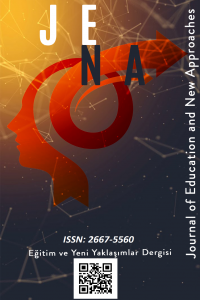
Eğitim ve Yeni Yaklaşımlar Dergisi
Yazarlar: ["Musa EROĞLU"]
Konular:-
DOI:10.52974/jena.1258278
Anahtar Kelimeler:Bilişsel Gelişim,Piaget,Vygotsky,Çocukluk dönemi
Özet: One of the most studied areas when studying human development is cognitive development. Cognitive activities are very important for people to know and comprehend the world. Cognitive development is the combination of experiences that help an individual adapt to their environment as the brain and nervous systems mature. Every individual who comes into the world comes with different mental structures. Through various learning experiences, adults have acquired detailed information about the environment and world they live in. Children, on the other hand, are unaware of what is going on in the outside world. While recognizing and comprehending the environment, the individual uses stages such as perception, memory, recording, judgment, comparison and interpretation. Childhood is undoubtedly a very important period for human life. In this period, the cognitive development of the individual is completed significantly. By the age of two, children can learn a lot about the world by walking, climbing, jumping, falling and getting up. As the child learns about the environment, he tries to get to know his environment better by asking more questions. Two of the most important theorists working in the field of cognitive development in this period are Piaget and Vygotsky. In this study, the cognitive development theories of Piaget and Vygotsky were examined and compared. In Piaget's Theory of Cognitive Development, more biological structures such as schema, adaptation, assimilation, adaptation and balancing are included. Piaget states that cognitive development is in a recurrent sequential structure. It has been seen that Vygotsky's theory mostly refers to the effect of the social environment. Vygotsky emphasized that the interventions of teachers, adult parents and others are very important for cognitive development.